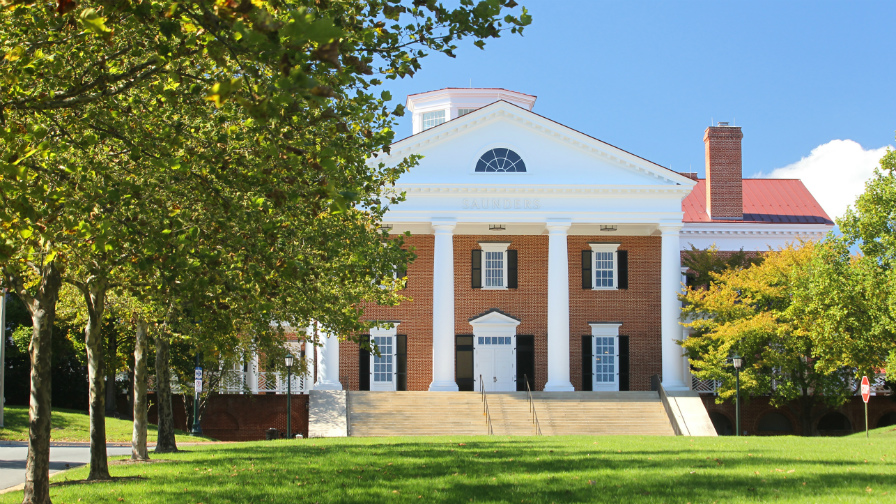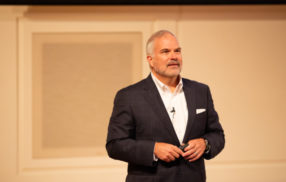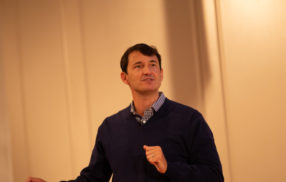
Former Reagan Admin Adviser Tackles Rise of ‘Deglobalization’ at UVA Darden Leadership Speaker Series Address
By Dave Hendrick
The period of increased globalization that began following the end of the Cold War brought unprecedented levels of international economic integration and a productive period of compounding prosperity relatively free of conflict among the world’s superpowers.
Now, according to Paul Schott Stevens, the recently retired president of Investment Company Institute (ICI), an association representing the global fund industry, the ascendant economic model of recent decades shows signs of giving way to a host of protectionist policies antithetical to global growth.

Paul Schott Stevens
Stevens, speaking virtually to a University of Virginia audience as part of a Darden School of Business Leadership Speaker Series address sponsored by the Richard A. Mayo Center for Asset Management, highlighted the specific cases of the European Union and China, both of which he said showed signs of retreating from the post-Cold War era of economic liberalization.
In addition to his previous role as head of ICI, the UVA School of Law graduate was a legal adviser in the administration of President Ronald Reagan, where he had a front row seat to the end of the Cold War and, shortly thereafter, the dissolution of the Soviet Union.
What followed was a “new world order,” driven by what came to be known as the Washington Consensus, Stevens said, and generally involved moderation in tax rates, the liberalization of financial markets, stable exchange rates, privitization of state-owned enterprises and freer trade.
“Together with the end of great power confrontation, these polices formed the foundation of the coming age of globalization,” said Stevens. “And with that age, came an era of shared prosperity unlike any in history.”
The traits could be seen in the formation of the EU in 1993. However, Europe has increasingly come to see conditioning access to its domestic marketing as a “unique source of global influence,” said Stevens, adding that the continent clearly prefers a unilateral approach over the “harder work of designing rules alongside other large and emerging markets.”
Stevens pointed to specific recent examples such as the EU’s General Data Protection Regulation; mandatory disclosure standards on environmental, social and governance factors; and various proposals for the regulation of digital services.
The moves are both “antithetical to globalization” and “a sure route to tensions,” he said.
Stevens described China, meanwhile, as the single biggest beneficiary of globalization — with dramatic reductions in poverty and rise in global stature — which has subsequently turned into its biggest threat. Stevens said the “spirit of enterprise” unleashed in recent decades has become a clear threat to the Communist Party, sparking a backlash.
Economies subject to command and control ultimately inevitably lose dynamism, Stevens said, which he described as the essential fuel that powers prosperity.
“China is choosing stability and risking stagnation,” Stevens said.
Ultimately, the advance of globalization has “never been linear,” Stevens said. While progress has ebbed and flowed, he believes the promotion of a “global approach to global problems” remains essential and a worthy approach for a still-influential United States.
The University of Virginia Darden School of Business prepares responsible global leaders through unparalleled transformational learning experiences. Darden’s graduate degree programs (MBA, MSBA and Ph.D.) and Executive Education & Lifelong Learning programs offered by the Darden School Foundation set the stage for a lifetime of career advancement and impact. Darden’s top-ranked faculty, renowned for teaching excellence, inspires and shapes modern business leadership worldwide through research, thought leadership and business publishing. Darden has Grounds in Charlottesville, Virginia, and the Washington, D.C., area and a global community that includes 18,000 alumni in 90 countries. Darden was established in 1955 at the University of Virginia, a top public university founded by Thomas Jefferson in 1819 in Charlottesville, Virginia.
Press Contact
Molly Mitchell
Senior Associate Director, Editorial and Media Relations
Darden School of Business
University of Virginia
MitchellM@darden.virginia.edu








